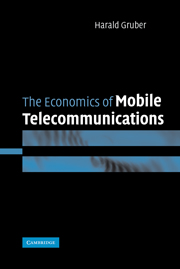Book contents
- Frontmatter
- Contents
- List of figures
- List of tables
- Preface
- List of abbreviations and acronyms
- 1 Introduction
- 2 Stylised features of the mobile telecommunications industry
- 3 The evolution of national markets for cellular mobile telecommunications services
- 4 The determinants of the diffusion of cellular mobile telecommunications services
- 5 Market conduct and pricing issues in mobile markets
- 6 Issues in radio spectrum management
- 7 The evolution of market structure in mobile telecommunications markets
- Appendix
- Bibliography
- Index
3 - The evolution of national markets for cellular mobile telecommunications services
Published online by Cambridge University Press: 22 September 2009
- Frontmatter
- Contents
- List of figures
- List of tables
- Preface
- List of abbreviations and acronyms
- 1 Introduction
- 2 Stylised features of the mobile telecommunications industry
- 3 The evolution of national markets for cellular mobile telecommunications services
- 4 The determinants of the diffusion of cellular mobile telecommunications services
- 5 Market conduct and pricing issues in mobile markets
- 6 Issues in radio spectrum management
- 7 The evolution of market structure in mobile telecommunications markets
- Appendix
- Bibliography
- Index
Summary
Introduction
In the cellular mobile telecommunications industry, as in many other network industries, governments intervene through various types of regulation concerning important issues such as entry licensing or setting of technical standards. The governments' decisions affect the diffusion of new technologies and have important welfare implications. Moreover, the fact that national governments have adopted different policies permits an interesting comparative analysis of the performance of such policies. There is usually little consensus among economists on the optimal policies to be followed in the context of rapid market growth and fast technological change, in the early days of the industry for instance it was unclear whether the industry was a ‘natural monopoly’ or whether it could make room for two or more firms. It was also disputed how entry by new firms should be organised. A further issue was whether it is in the public interest that the policy maker set a technological standard, or whether this decision should be left to the market through competition among systems. Another way of putting this question is whether standards created markets or markets created standards. The development of cellular mobile telecommunications was therefore deemed to have been crucially affected by domestic policies concerning market structure and choices of technology. The main purpose of this chapter is to explore these issues in a simple analytical framework that crystallises the main points.
- Type
- Chapter
- Information
- The Economics of Mobile Telecommunications , pp. 65 - 143Publisher: Cambridge University PressPrint publication year: 2005



